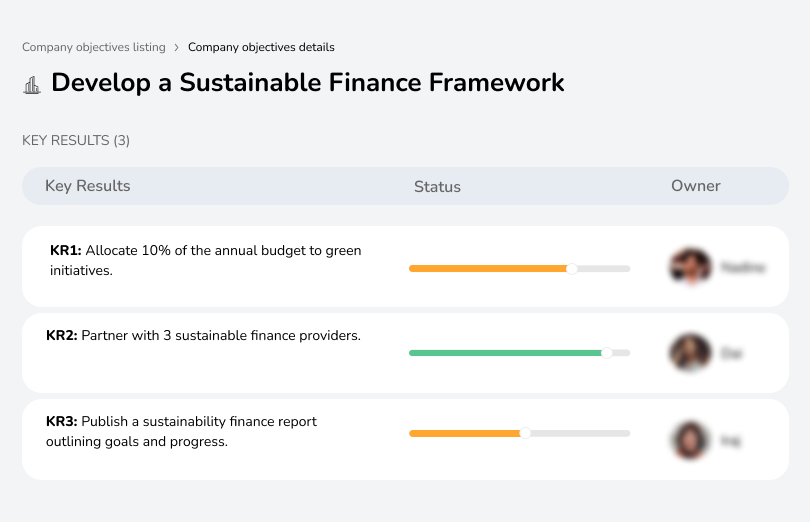Free OKR Templates
Download templatesThe CFO in cement manufacturing is responsible for safeguarding the company’s financial health and providing strategic financial leadership. They oversee budgeting, financial planning, risk management, and regulatory compliance to ensure sustainable growth and profitability.
This role involves evaluating financial performance, optimising costs, and identifying investment opportunities to enhance operational efficiency and support business expansion. The CFO works closely with the executive team to align financial strategies with organisational goals, ensuring informed decision-making for long-term success.
In cement manufacturing, the CFO is pivotal in maintaining financial stability, driving cost-effectiveness, and securing the resources needed to support operations, innovation, and strategic growth in a highly competitive, capital-intensive industry.
15 OKR Templates for CFO (Cement Manufacturing)
1. Challenge: Inaccurate forecasts lead to inefficient resource allocation
Objective: Improve Financial Forecasting Accuracy
Owned by: CFO
Due date: 4 months
- KR1: Implement advanced forecasting tools across all financial planning processes.
- KR2: Achieve a 95% accuracy rate in revenue forecasts.
- KR3: Conduct monthly reviews to validate and adjust financial projections.
2. Challenge: Inefficient working capital use increases financial strain
Objective: Optimize Working Capital Management
Owned by: CFO
Due date: 5 months
- KR1: Reduce the cash conversion cycle by 15%.
- KR2: Increase accounts receivable collection efficiency by 10%.
- KR3: Decrease inventory holding costs by 20%.
3. Challenge: High operational costs reduce profitability
Objective: Reduce Operational Costs Without Impacting Quality
Owned by: CFO
Due date: 6 months
- KR1: Identify and implement cost-saving measures to reduce expenses by 10%.
- KR2: Conduct quarterly cost audits across all departments.
- KR3: Reduce procurement costs by renegotiating 80% of supplier contracts.
4. Challenge: Regulatory non-compliance poses significant risks
Objective: Strengthen Financial Compliance and Risk Management
Owned by: CFO
Due date: 6 months
- KR1: Achieve 100% compliance with all financial reporting regulations.
- KR2: Conduct risk assessments for all financial processes bi-annually.
- KR3: Develop and implement a risk mitigation strategy for the top 5 identified risks.

5. Challenge: Declining profit margins limit growth potential
Objective: Improve Profit Margins Through Strategic Initiatives
Owned by: CFO
Due date: 6 months
- KR1: Increase EBITDA margin by 5%.
- KR2: Optimize pricing strategies for high-demand regions.
- KR3: Identify and eliminate 3 non-essential cost drivers.

6. Challenge: Limited investor confidence affects funding opportunities
Objective: Enhance Investor Relations and Communication
Owned by: CFO
Due date: 5 months
- KR1: Publish detailed quarterly financial reports on time.
- KR2: Conduct 4 investor engagement sessions to showcase business growth.
- KR3: Improve investor satisfaction score by 20%.

VP of Compliance (Financial Services) Templates: Click here
7. Challenge: Over-reliance on core products increases business risk
Objective: Diversify Revenue Streams
Owned by: CFO
Due date: 6 months
- KR1: Identify and invest in 2 new product lines or markets.
- KR2: Achieve 10% of total revenue from diversified sources.
- KR3: Partner with 3 external firms for co-development opportunities.
8. Challenge: High debt levels strain cash flow
Objective: Optimize Debt and Equity Balances
Owned by: CFO
Due date: 4 months
- KR1: Reduce debt-to-equity ratio by 10%.
- KR2: Refinance 30% of existing loans to lower interest rates.
- KR3: Allocate 15% of net income to debt repayment.

9. Challenge: Manual processes reduce efficiency in financial operations
Objective: Drive Technology Adoption in Financial Processes
Owned by: CFO
Due date: 5 months
- KR1: Implement ERP software across 100% of financial operations.
- KR2: Automate 80% of routine financial reporting tasks.
- KR3: Train 100% of finance team members on new technologies.

10. Challenge: Lack of sustainability initiatives in finance hampers long-term viability
Objective: Develop a Sustainable Finance Framework
Owned by: CFO
Due date: 6 months
- KR1: Allocate 10% of the annual budget to green initiatives.
- KR2: Partner with 3 sustainable finance providers.
- KR3: Publish a sustainability finance report outlining goals and progress.

11. Challenge: Poor cost oversight leads to budget overruns
Objective: Strengthen Cost Control Measures
Owned by: CFO
Due date: 4 months
- KR1: Implement cost control dashboards for 100% of departments.
- KR2: Reduce non-operational expenses by 15%.
- KR3: Ensure 95% of projects remain within budget constraints.

12. Challenge: Cash flow shortages delay critical projects
Objective: Enhance Cash Flow Management
Owned by: CFO
Due date: 5 months
- KR1: Maintain a minimum cash reserve equal to 3 months of operational costs.
- KR2: Improve cash flow forecasting accuracy by 20%.
- KR3: Reduce payment delays from clients by 10%.






